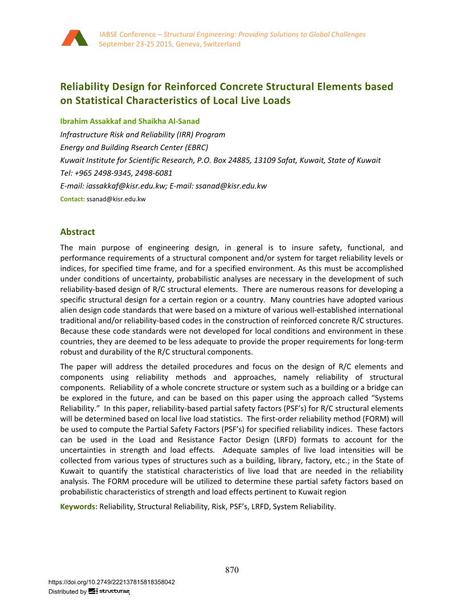Reliability Design for Reinforced Concrete Structural Elements based on Statistical Characteristics of Local Live Loads

|
|
|||||||||||
Bibliografische Angaben
| Autor(en): |
Shaikha AlSanad
(Infrastructure Risk and Reliability (IRR) Program Energy and Building Rsearch Center (EBRC), Kuwait Institute for Scientific Research, P.O. Box 24885, 13109 Safat, Kuwait)
Ibrahim Assakkaf (Infrastructure Risk and Reliability (IRR) Program Energy and Building Rsearch Center (EBRC), Kuwait Institute for Scientific Research, P.O. Box 24885, 13109 Safat, Kuwait) |
||||
|---|---|---|---|---|---|
| Medium: | Tagungsbeitrag | ||||
| Sprache(n): | Englisch | ||||
| Tagung: | IABSE Conference: Structural Engineering: Providing Solutions to Global Challenges, Geneva, Switzerland, September 2015 | ||||
| Veröffentlicht in: | IABSE Conference Geneva 2015 | ||||
|
|||||
| Seite(n): | 870-877 | ||||
| Anzahl der Seiten (im PDF): | 8 | ||||
| Jahr: | 2015 | ||||
| DOI: | 10.2749/222137815818358042 | ||||
| Abstrakt: |
The main purpose of engineering design, in general is to insure safety, functional, and performance requirements of a structural component and/or system for target reliability levels or indices, for specified time frame, and for a specified environment. As this must be accomplished under conditions of uncertainty, probabilistic analyses are necessary in the development of such reliability-based design of R/C structural elements. There are numerous reasons for developing a specific structural design for a certain region or a country. Many countries have adopted various alien design code standards that were based on a mixture of various well-established international traditional and/or reliability-based codes in the construction of reinforced concrete R/C structures. Because these code standards were not developed for local conditions and environment in these countries, they are deemed to be less adequate to provide the proper requirements for long-term robust and durability of the R/C structural components. The paper will address the detailed procedures and focus on the design of R/C elements and components using reliability methods and approaches, namely reliability of structural components. Reliability of a whole concrete structure or system such as a building or a bridge can be explored in the future, and can be based on this paper using the approach called “Systems Reliability.” In this paper, reliability-based partial safety factors (PSF’s) for R/C structural elements will be determined based on local live load statistics. The first-order reliability method (FORM) will be used to compute the Partial Safety Factors (PSF’s) for specified reliability indices. These factors can be used in the Load and Resistance Factor Design (LRFD) formats to account for the uncertainties in strength and load effects. Adequate samples of live load intensities will be collected from various types of structures such as a building, library, factory, etc.; in the State of Kuwait to quantify the statistical characteristics of live load that are needed in the reliability analysis. The FORM procedure will be utilized to determine these partial safety factors based on probabilistic characteristics of strength and load effects pertinent to Kuwait region |
||||
| Stichwörter: |
Zuverlässigkeit Risiko Tragwerkszuverlässigkeit
|
||||
